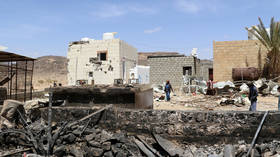Trump’s backing of Saudi war in Yemen is ‘business decision’

President Donald Trump’s veto of a resolution aimed at ending US support for Saudi Arabia’s brutal war in Yemen means that, in Washington, business interests outweigh humanitarian concerns, political analyst Colin Cavell told RT.
The US president has “no compunction” about the thousands of civilians who were killed in the brutal war since 2015, said Cavell, adding that Trump’s cooperation with Saudi Arabia is solely a “business decision.”
“He [Trump] sees it strictly as a transactional relationship to keep US capitalism going, to fuel US industry. He has no human rights concerns.”
Trump himself has practically admitted as much. Last October, the US president said that canceling an ongoing US’ $110 billion arms deal with the Kingdom would be “foolish,” even as allied nations scrapped their weapons deals with Riyadh in the wake of the murder of journalist Jamal Khashoggi.
Saudi Arabia is the largest end-user of American weapons in the world, and received some $3.5 billion in arms from the US last year.
The Saudi regime has faced criticism not just for Khashoggi’s death – which it attributed to rogue operatives – but for its role in Yemen’s ongoing civil war, a festering conflict that has pitted the Saudi-backed Sunni government against the Shia Houthi rebels since 2015.
In April both the House of Representatives and the Senate voted to withdraw from its supporting role in the conflict, but the resolution was vetoed by president Trump who called it “unnecessary” and “dangerous,” asserting that the US was “not engaged in hostilities in or affecting Yemen.”
On Wednesday, the Senate failed to reach a two-thirds majority to overturn Trump’s veto, meaning that the US support for the Saudi war will continue.
Also on rt.com Senate votes to uphold Trump veto on ending US support for Saudi-led war in YemenA growing number of politicians on both sides of the aisle disagree with Trump’s decision to stand by Riyadh. 2020 Democratic front-runner Senator Bernie Sanders (I-Vermont) slammed the US involvement in a “catastrophic war” and called the ruling Saudi royals a “despotic regime with a dangerous and irresponsible foreign policy.”
“Thousands of civilians have been killed by Saudi bombings in Yemen,” wrote Senator Rand Paul (R-Kentucky). “The blowback from these civilian deaths will be generations of hatred and likely more terrorism.”
The Saudi-led coalition’s bombing campaign has left more than 18,000 civilians dead, according to the Yemen Data Project. In addition, the Saudi land, sea, and air blockade of Yemen has caused shortages of food, medicine, and clean water in what is already the Arab world’s poorest country. As a result, an estimated 85,000 children under the age of five have died of starvation, according to UN data.
The man-made famine in Yemen is the world’s worst food crisis, according to the Food Security Information Network’s latest global report on food crises. Late last year, the UN warned that 14 million people in Yemen –around half the country’s population– were facing acute risk of starvation, in what could be “the worst famine in the world in 100 years.”
Also on rt.com It may turn out France was complicit in Saudi war crimes in Yemen – Member of investigative groupAmerica’s role in the conflict began under the Obama administration and continued under Trump. The US has armed Saudi Arabia with fighter jets, armored vehicles, missiles and bombs; and has provided intelligence and logistical support to the Kingdom’s war effort.
This support continued even as US-made bombs rained down on civilians. Pieces of a laser-guided bomb manufactured by US defense corporation Lockheed Martin were found at the site of a Saudi attack on a school bus last August, in which 40 children were killed. Despite the Saudi pilots’ American training, President Trump blamed the massacre on their inability to “use the weapon” properly.
If you like this story, share it with a friend!













